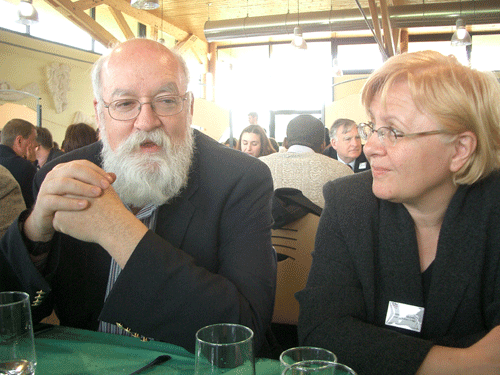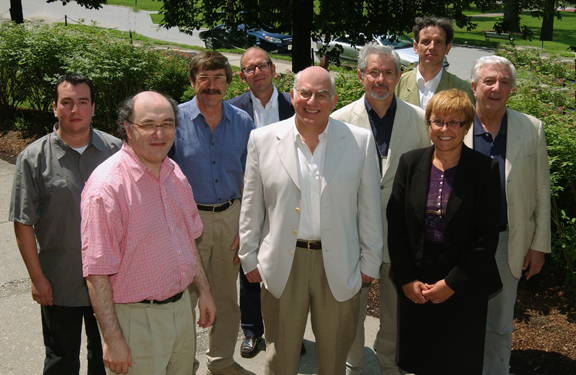RESEARCH
PROJECTS
INTERNATIONAL
ACADEMY OF INFORMATION STUDIES
work on organizing worlds leading scientists and thinkers in
research of information in its various forms and processes
Current research topics
Morphological computing, Natural computing,
Material
computing, Intelligent matter, Cognitive matter,
Info-computational conceptual framework and modelling, Foundations of information, Foundations of computing, Info-computational models of cognition,
Cognition and
Intelligence, natural and computational, Computing and philosophy, Computing ethics, Information ethics, AI
ethics, Robotic ethics and Critical Robotics, Ethical aspects of autonomous vehicles
Rethinking
Intelligence
Natural Philosophy of Information and Computing
Morphological Computing in Cognitive Systems
MORCOM@COGS (2016-2023) - Swedish Research Council,
Continues
MORCOM@COGS is a project at Chalmers
University of Technology, funded by the Swedish Research
Council (VR), for the period 2016-01-01 - 2021-12-31.
Morphological Computing in Cognitive Systems is an area of
research with studies of computational cognitive mechanisms
in natural and artificial systems including cognitive
matter.
Nature has, through evolution, developed information processing in living organisms that use to increase our ability to computationally handle the increasing amounts of data that are being generated. Therein lies the importance of knowledge of natural computation processes modeled in scientific frameworks and with analytical tools.
Computation can be understood as physical processes in nature. Natural computation can be used to explain emergent phenomena by complexification of information through computational processes at different levels of organization. We propose a synthetic framework in which information represents the structure and computation processes its changes (dynamics). The consequence of the new framework is that physical objects and processes can be modeled, interpreted and predicted by info-computational methods. The MORCOM framework is used as a tool for studying cognitive systems such as living organisms on different levels of complexity.
MORCOM@COGS develops a conceptual
framework in which the computation process is generalized
from abstract symbol manipulation of the Turing machine type
to the information processes in physical systems. The
project studies how information is created and structured on
different levels or scales and how it changes through
natural processes in cognitive systems.
Consequences of the shift in modeling of computation toward
cognitive computing are examined by comparing existing
models with the new, morphological computations applied to
various classes of cognitive systems in nature. Complex
systems in nature have already inspired a number of methods
for information processing - including artificial neural
networks, genetic algorithms and genetic programming, and
development continues.
The project aims are:
1) Further develop the framework of natural info-computation. There are already enough elements of a theory based on natural computation processes that is much more appropriate for modeling of complex cognitive systems than those we have today. We compare the new approach with the existing Turing machine model of cognitive systems - open versus closed systems, generative versus predetermined sequence, parallel versus sequential processes, and so on. We investigate the consequences of the generalization of the concept of computation with application to morphological processes in which the morphology of a cognitive system determines the dynamics of its information structure.
2) Models based on morphological
computation can be applied to various cognitive
systems. In morphologically-based models sensors and
actuators are given by the morphology of the genotype, while
the middle layer develops in an ongoing process as
phenotype. An organism consists here of an information
network of networks developed according to a few basic
principles, sensors and actuators, morphology-based Hebbian
and Bayesian learning, perception and anticipation, and so
on. This leads to a morphological system that constantly
evolves in interaction with the environment.
One of the foci of our interest is the interplay between
structure (morphology) and process of its change
(computation).
Morphological computation is a process
of creation of new informational structures, from the
existing ones, as it appears in nature. It presents
informational view of computing nature.
Morphological computation is computation understood as
morphogenesis (the origin and development of morphological
characteristics, such as shape, form, and material
composition in material bodies) on different levels of
organization: physical, chemical, biological, cognitive, and
virtual-machine computation built on top of them.
Morcom@COGS project investigates
cognitive systems as information processing mechanisms of
different complexity, with cognitive computation models
based on physical (morphological) computation. The goal is
to learn from nature how to better handle the complexity and
the large amounts of data in a robust and efficient manner,
in a sense of material and energy consumption.
The project builds on a framework of info-computational
naturalism in which information is understood as a structure
and computation as its dynamics (transformation of that
structure).
Cognition is a process that living organisms use to stay
alive and thrive as individuals and species. Artificial
computational systems use cognitive capacities in order to
efficiently produce meaningful goal-directed behaviours.
Cognition exists in all living organisms, from single cell
(basal cognition) to cell networks, swarms, tissues, organs,
organisms, societies and ecologies. From that unifying
principles for efficient meaningful information processing
can be extracted, comparing similar mechanisms in action on
different levels from single ordinary cell to the embodied
brain.
Within the project, we study a framework
for a generalized concept of computation as morphological
process - a process of self-organization of information in a
cognitive agent, natural and artificial.
Ethics4EU (2019-2022)
Project led by TU Dublin School of
Computer Science in partnership with Informatics Europe,
Mälardalen University in Sweeden, Télécom SudParis and the
European Digital E-learning Network. http://ethics4eu.eu/
Applied robotics/critical robotics group
(2019-2021)
PICO - Philosophy of Information and
Computing (2000-current)
Project at Mälardalen University, funded
initially by KKS, afterwards faculty funding. Philosophy of
Information and Computing (PICO) combines scientific,
philosophical and ethic perspectives on the two fundamental
phenomena: computation (the process) and information (the
structure) . Different aspects of the field are intensely
developing internationally within Computing and Philosophy,
Foundations of Information, Computability in Europe, Natural
Computing, BITRUM and ISIS research communities. Our
contributions to the field up to now: organization of the
E-CAP 2005, European Computing and Philosophy Conference,
followed by the proceedings published in tripleC (tripleC -
Cognition, Communication, Co-operation), Information and
Entropy journals and number of articles and book chapters
and four books within the field. In 2012 two symposia
organized within AISB/IACAP Alan Turing World Congress in
Birmingham, on Natural/Unconventional Computing and Social
Computing/ Multiagent Systems.Two special journal issues
prepared for journals Information and Entropy. In 2013
COMUTING NATURE book have been published in Springer SAPERE
Series.

With Daniel Dennett at
i-C&P Conference on Computers & Philosophy, Laval,
France, 2006

Wolfram NKS
conference 2007
From left: Hector Zenil, Stephen Wolfram, Paul Davies, Ugo
Pagallo,
Gregory Chaitin, Cristian Calude, Karl Svozil, Gordana
Dodig-Crnkovic and John Casti
ITS-EASY Post Graduate School (2011-2018)
Project at Mälardalen University funded
by KKS. ITS-EASY is an research school in Embedded Software
and Systems, affiliated with the School of Innovation,
Design and Engineering (IDT) at Mälardalen University (MDH),
as an integrated part of the MDH strategic research area
Embedded Systems (ES).
ITS-EASY envisions to be a unique
industrial research school par excellence in the Embedded
Systems domain in Sweden. ITS-EASY is focused on topics of
paramount importance for dominating parts of Swedish
industry: Embedded Systems including Software-Intensive
Systems, Dependable (reliable and safe) Systems, and Sensor
Systems. The main industrial domains considered are
automation, telecommunication and vehicles.
Digitalisation for a Sustainable Society -
Summit of the International Society for the Study of
Information - 2017
Project at Chalmers University of
Technology, funded by the Swedish Research Council FORMAS.
The aim of this project was to support organisation of the
summit of the International Society for the Study of
Information, is4si 2017 Gothenburg.
The stage for the Gothenburg summit is
set by the theme of Digitalisation for sustainable society,
in light of information, computation and cognition. As our
previous meetings, the summit 2017 reflects the moment we
live in – a nascent movement of digitalization that has
started to radically change our society, globally, in
literally all its aspects. It is based on the computing
technology (in all its forms, digital and analogue, that all
now go under the name “digital” that stands for any kind of
computational system), which in its turn is based on
information and data processing, which all goes back to
cognition and intelligence of a cognizing agent in order to
acquire meaning.
Digitalization has a potential to
fundamentally transform the way we live, our whole
civilization and our identities. Often mentioned definition
from the Business dictionary: Digitalization is integration
of digital technologies into everyday life by the
digitization of everything that can be digitized – does not
tell it all. Digitization as transformation of everything
into digital data is only part of the story, telling that
libraries will be digitized and turned into formats easy to
process by computers. Sensors of various kinds, controlling
variety of processes, from traffic control to health care,
education, entertainment, production, monetary flows and
government will produce increasing amounts of data suitable
for further processing and analytics. Finished 31/12/2017.
See: http://is4si-2017.org
PIFF (2009-2010)
Project done at Mälardalen University in
collaboration with Lund University and BTH, funded by NSHU.
Programvaruexjobb för Industri- och ForskningsFramgång
(Supporting framework for Software Engineering diploma work
done in collaboration between industry and research in
Sweden) Diploma degrees are awarded by academia, while
diploma work is often done in collaboration with industry or
a research group. The aim of the PIFF project is to improve
knowledge exchange between academia, industry and research
during diploma work, supporting both a student and an
advisor in the different phases (planning, execution and
grading/assessment) of diploma work in Software Engineering.
The results of the project will be generalizable to other
multidisciplinary and cross-disciplinary fields.
2025-03-28